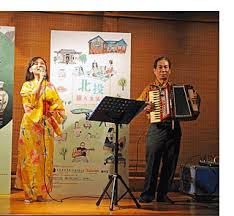You have to have a song, pt. 1

When I was little, my parents would often take us to Beitou, up in the mountains just north of Taipei, where there were several hot spring hotels that made good use of the natural underground sulfur. When we drove up the mountains, the eggy smell permeated our car, and the mountains would be steamy with heat. Sometimes, Dad would stop the car by the road and we would climb down to the streams, which were piping hot, cloudy and grey with minerals, and submerge a netted bag of eggs into the water to make soft boiled eggs. After snacking on these sulfur eggs, we would make our way to 春天酒店, one of the oldest hot spring hotels. Usually, we would meet other families at the hotel and once there, we would change into cotton robes and the women and men would split up to spend the afternoon dipping in and out of the natural hot springs until our skin was red and glistening. Dinner would be served in a large tatami room, where the adults sat cross legged or on their knees and we kids could tumble around the open areas of the tatami.
The highlight of the evening was when the 那卡西 (nagshi) band – always the same band, a married couple – would arrive. The husband would set up his keyboard and the wife would hook up a wired microphone to a big, black amplifier. They both had a plastic sleeved songbook, which they set up on their flimsy steel, foldable music stands. When I was very young – and especially when my grandparents and their friends came along, too – the nagashi couple would sing old Japanese songs, the melody sharp and flat, unlike the predictable roundness of Western melodies, and though I didn’t understand the words, I recognized the emotion as wistfulness. The woman would take out a maraca or a tambourine from her bag and hit it against the base of her palm or against her thigh, to keep the beat. If the conversation at the dinner table lulled, the adults would automatically start swaying to the music, their eyes glassy with feeling.
Once the adults’ cheeks were rosy from drinking, the couple would switch to singing Taiwanese songs and inevitably, everyone would start to sing along. Sometimes, the woman would drag the microphone along the low tables and pass it around. After that, people would start to make song requests and take over her spot at the front of the room and she would stand in the back and shake her tambourine and when someone forgot lyrics, she would gently feed them the words from behind. When someone started to sing off key, the husband would lean into his microphone, clipped to a stand on his keyboard, to help nudge the singer back on track. The duo was an entertainment act, but they were also skilled at keeping the spirit of the room at the appropriate level - they read the room and knew when to bring up the energy and when to start mellowing things down.
This formed the foundation of my experience and understanding of karaoke culture in Taiwan. The notion that adults would gather to eat and drink and sing together until the kids had fallen asleep on the tatami mats was a pastime as normal as listening to the clacking of mah-jong tiles on Sunday afternoons. Still, I never assumed it would be what I would do as an adult.
